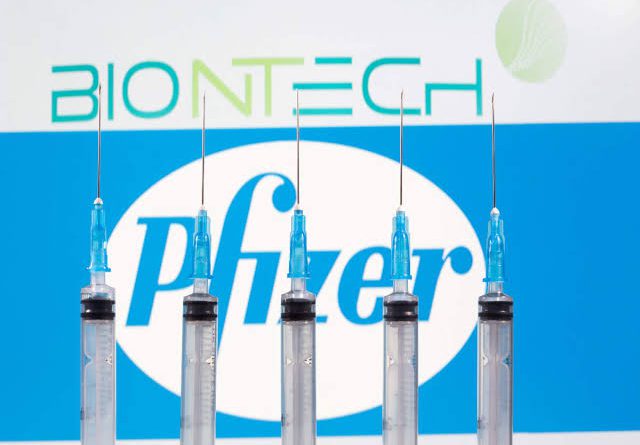Pfizer/BioNTech COVID-19 shot 91% effective in updated data, protective against South African variant
Reuters
The vaccine was 95.3% effective in preventing severe disease as defined by the U.S. Food and Drug Administration.
Pfizer Inc and BioNTech said on Thursday their vaccine is around 91% effective at preventing COVID-19, citing updated trial data that included participants inoculated for up to six months.
The shot also showed early signs of preventing disease in a small subset of study volunteers in South Africa, where a concerning new variant called B.1.351 is circulating.
Although lower than the stunning 95% efficacy result reported from its 44,000-person clinical trial in November, overall efficacy of 91.3% shows the vaccine to be a powerful tool against an evolving virus. The virus now has more transmissible forms and those that have been shown to evade antibody protection in lab studies and real-world clinical trials.
“These data reinforce our view that we have some really potent vaccines,” said Danny Altmann, a professor of immunology at Britain’s Imperial College London, who was not involved in the Pfizer trial.
Pfizer’s Chief Executive Officer Albert Bourla said the updated result, which includes data on more than 12,000 people fully inoculated for at least six months, positions the drugmakers to submit for full U.S. regulatory approval.
The vaccine is currently authorized on an emergency basis by the U.S. Food and Drug Administration.
The trial data “provide the first clinical results that a vaccine can effectively protect against currently circulating variants, a critical factor to reach herd immunity and end this pandemic for the global population,” Ugur Sahin, chief executive officer at BioNTech, said in a statement.
Experts fear new variants of COVID-19 from South Africa and Brazil may be resistant to existing vaccines and treatment. More than 300 cases of the South African variant have been detected in more than 25 U.S. states and jurisdictions, according to federal data.
Lab tests have previously indicated that the Pfizer/BioNTech vaccine was less potent but still offered a robust defense against the B.1.351 variant that first emerged in South Africa.
The data released on Thursday offered the first look at how the vaccine might work in people against the South African variant. Among a group of 800 study volunteers in South Africa, where the variant is widespread, there were nine cases of COVID-19, all of which occurred among participants who got the placebo. Of those nine cases, six were among individuals infected with the South African variant.
“The Pfizer data are a big deal,” said Shane Crotty, a virologist at the La Jolla Institute for Immunology in San Diego, noting that the results offer the first data in humans about how so-called mRNA vaccines such as Pfizer’s will perform against the South African variant.
“Six infections versus zero is something,” he said in an email, but noted the sample size is still “not enough to make conclusions about protection.”
Although the B.1.1.7 variant that originated in Britain has quickly spread across Europe and is gaining a foothold in the United States, the B.1.351 variant and similar variants are more concerning because they have shown to reduce the efficacy of three different COVID-19 vaccines in clinical trials in South Africa.
BioNTech reiterated this week there would likely be a future need for booster shots that specifically address new variants and that the group was preparing to upgrade its vaccine when needed. A spokeswoman said on Thursday its strategy remains in place.
The vaccine was 95.3% effective in preventing severe disease as defined by the U.S. Food and Drug Administration.
There were also no serious safety concerns observed in trial participants up to six months after the second dose, the companies said.
The trial reviewed more than 900 confirmed cases of COVID-19, most of which were among participants who received a placebo.
The results follow separate data that showed the vaccine is safe and effective in 12- to 15-year olds, paving the way for the drugmakers to seek U.S. and European approvals for this group.



